Best Sustainable Dog Food

DogFoodAdvisor is reader supported See how
All reviews are 100% impartial but if you buy using links on this page, we may earn a referral fee.
What’s the best sustainable dog food?
Whether you’re someone who already prioritizes sustainability as a factor when choosing dog food, or you’re new to the concept and would like to start being more ‘green’ at the pet store, there are now multiple options on the dog food market which are labeled as sustainable.
But what does sustainable dog food look like?
Sustainable, according to the Merriam-Webster dictionary, is defined as “a method of harvesting or using a resource so that the resource is not depleted or permanently damaged.”
So in the case of dog food, sustainability relates to the creation of a recipe and the source of its ingredients rather than the nutritional values. A sustainable dog food may have a recipe which includes:
- Locally-sourced ingredients
- USDA-certified label
- Insect protein or poultry – which require less land, water, and feed to produce
- Vegan or vegetarian ingredients
- Organic or non-GMO ingredients
However, it is important to note that the above list is not exhaustive. Sustainability is a movement which is constantly developing as science, technology and research progress.
We will also be listing dog food brands which are sustainable in their business practices, such as recycled packaging, eco-friendly delivery methods, and ethical partnerships.
A note on sustainable dog food
Every dog is unique, and what works for one dog may not work for another. Some dogs may adapt well to a change in diet, while others may experience health issues or deficiencies. Before making any significant changes to your dog’s diet, consult with a veterinarian or a veterinary nutritionist. They can assess your dog’s specific needs and help you develop a balanced diet plan, or recommend alternative diets that align with your values while meeting your dog’s nutritional requirements.
If you’re considering changing your dog’s diet for ethical or personal reasons, it’s crucial to prioritize your dog’s health and well-being. Transition gradually and look out for signs that the new diet isn’t suiting them. Always consult a professional to ensure your dog’s diet is nutritionally complete and appropriate for their individual needs. Food that has an AAFCO nutrient profile of complete and balanced food will be nutritionally complete.
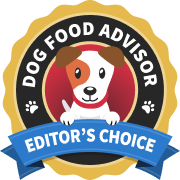
Best Sustainable Dog Food April 2024
Here are The Dog Food Advisor's best dog food brands for Sustainable Dog Food for April 2024.
-
1. Open Farm
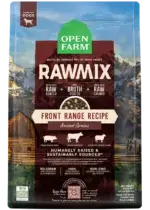
Open Farm Rawmix Wild Ocean Grain-Free is one of 6 raw recipes included in our review of the Open Farm Rawmix product line.
Open Farm Rawmix Wild Ocean Grain-Free derives the bulk of its protein from fish. Dry matter label analysis reveals the recipe contains 32.6% protein, 16.3% fat and 43.1% estimated carbs… resulting in a fat-to-protein ratio of about 50%.
Ethically & sustainably sourced – non-GMO grains, fruits & vegetables, high in protein and 3 & 6 fatty acids.
Read our review of the full Open Farm Raw Mix Dog Food range here
Main Ingredients Ocean whitefish, menhaden fish meal, potatoes, sweet potatoes, herring meal Type Grain-Free Protein Percentage 32.6% AAFCO Standards All Life Stages Best For Puppies & Dogs Sample buyer review...
Read more buyer reviews at OpenFarmPet.com"My dogs are not food motivated at all. Typically we have to monitor to make sure that they are eating (busy bodies). NOT ANYMORE. My dogs go NUTS over this food! It gives me peace of mind knowing that my dogs are eating food with healthy and natural ingredients as well. This food has worked wonders on our dogs coats. -Stella (weimeraner), Draco (doberman), and Cali (chihuahua)"
-
2. The Honest Kitchen
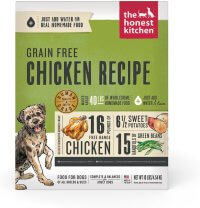
The Honest Kitchen Grain-Free Chicken Recipe is one of 8 dehydrated recipes included in our review of the The Honest Kitchen Dehydrated product line.
The Honest Kitchen Grain-Free Chicken Recipe derives the bulk of its meat protein from chicken. Dry matter label analysis reveals the recipe contains 26.2% protein, 15.3% fat and 50.5% estimated carbs… resulting in a fat-to-protein ratio of about 58%.
Non-GMO ingredients and free range chicken, gently dehydrated to maintain nutrients & taste.
Read our review of the full Honest Kitchen Grain Free Dog Food (Dehydrated) range here
Main Ingredients Dehydrated chicken, flaxseed, dehydrated potatoes, dehydrated sweet potatoes, dried apples Type Grain-Free Protein Percentage 26.2% AAFCO Standards Adult Maintenance Best For Dogs Sample buyer review...
Read more buyer reviews at TheHonestKitchen.com"She loves her food. Has been using Honest Kitchen since we got her as a puppy. Her weight has been perfect and she is in perfect health."
-
3. Tender & True
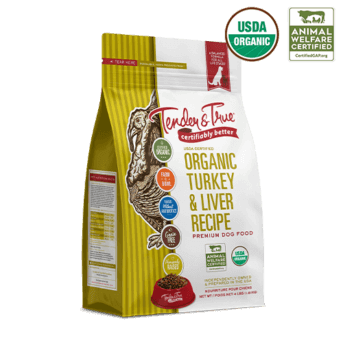
Tender & True Turkey & Liver Grain-Free is one of 7 dry recipes included in our review of the Tender & True Organic Dry product line.
Tender & True Turkey & Liver Grain-Free derives the bulk of its meat protein from turkey. Dry matter label analysis reveals the recipe contains 28.9% protein, 17.8% fat and 45.3% estimated carbs… resulting in a fat-to-protein ratio of about 62%.
USDA certified organic and non GMO ingredients with added vitamins, minerals and other trace nutrients.
Read our review of the full Tender and True Dog Food (Dry) range here
Main Ingredients Organic Turkey, Organic Chicken meal, Organic tapioca starch, Organic dried peas, Organic chickpea Type Grain-Free Protein Percentage 28.9% AAFCO Standards All Life Stages Best For Puppies & Dogs Sample buyer review...
Read more buyer reviews at TenderAndTruePet.com"Our three dogs are very picky about their food, and we don’t like to feed them less than the best. We got a sample of your food and decided to buy two bags for them. We got the Organic Chicken & Liver (dry) and they love it! It has also helped one of them with gastrointestinal issues. We would recommend the product to all of our friends and family. Thank you for making something that we feel safe and happy to feed our furbabies!!!"
-
4. Gather
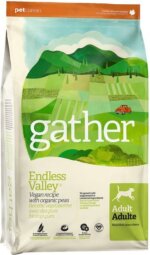
Gather Endless Valley Vegan Recipe With Organic Peas is one of 3 dry recipes included in our review of the Gather dry product line.
Gather Endless Valley Vegan Recipe With Organic Peas derives the bulk of its protein from peas. Dry matter label analysis reveals the recipe contains 24.4% protein, 12.2% fat and 55.3% estimated carbs… resulting in a fat-to-protein ratio of about 50%.
Certified organic and non-GMO ingredients sustainably produced. Protein packed with all essential amino acids.
Read our review of the full Gather Dog Food (Dry) range here
Main Ingredients Organic peas, organic barley, organic oats, lentils, organic sunflower oil Type Grain-Inclusive Protein Percentage 24.4% AAFCO Standards Adult Maintenance Best For Dogs Sample buyer review...
Read more buyer reviews at GatherPetFood.com"As a plant-based family, it was very important to us that our pup’s diet was plant-based too. One of the things we were worried about prior to adopting our dog was being able to find a high-quality, vegan kibble. Well… after a bit of searching, we were so ecstatic to come across an article that talked about Gather Endless Valley! Our girl LOVES this food and gobbles it up like she’s eating a big bowl of treats. Thank you for making not only a plant-based dog food, but one that goes the extra mile and is GMO-free and organic. The best of all worlds!"
-
5. Spot & Tango
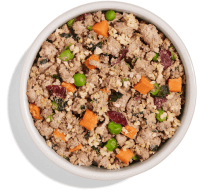
Spot & Tango Beef & Millet is one of 3 fresh recipes included in our review of the Spot & Tango Fresh product line.
Spot & Tango Beef & Millet derives the bulk of its meat protein from beef. Dry matter label analysis reveals the recipe contains 40% protein, 20% fat and 32% estimated carbs… resulting in a fat-to-protein ratio of about 50%.
Non-GMO ingredients cooked in USDA certified kitchens. Fresh & whole ingredients and no artificial preservative, fillers or additives.
Read our review of the full Spot and Tango Dog Food (Fresh) range here
Main Ingredients Beef, millet, eggs, spinach, carrots Type Grain-Free Protein Percentage 40% AAFCO Standards All Life Stage Best For Puppies & Dogs Sample buyer review...
Read more buyer reviews at SpotandTango.com"Rue LOVES her food from Spot and Tango. She is thriving. Her coat is glossy and healthy. I would highly recommend this food to any pet owner who is truly concerned about the nutrition and quality of their dogs food."
-
6. Steve’s Real Food
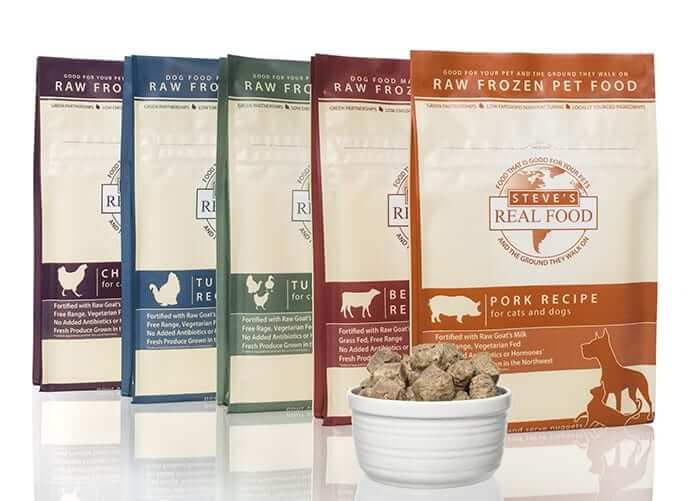
Steve’s Real Food Beef Diet is one of 6 raw-frozen recipes included in our review of the Steve’s Real Food Raw Frozen product line.
Steve’s Real Food Beef Diet derives the bulk of its meat protein from beef. Dry matter label analysis reveals the recipe contains 48% protein, 32% fat and 12% estimated carbs… resulting in a fat-to-protein ratio of about 67%.
USDA certified and sustainably sourced ingredients. This is a low fat, nutrient-dense meat recipe.
Read our review of the full Steve’s Real Food Dog Food (Raw Frozen) range here
Main Ingredients Ground beef, beef liver, beef kidney, broccoli, beef bone Type Grain-Free Protein Percentage 48% AAFCO Standards All Life Stages Best For Puppies & Dogs Sample buyer review...
Read more buyer reviews at StevesRealFood.com"My dog loves the beef formula and I love how all the needed vitamins and minerals come from real, fresh ingredients and not synthetic vitamin packs."
-
7. Freshpet
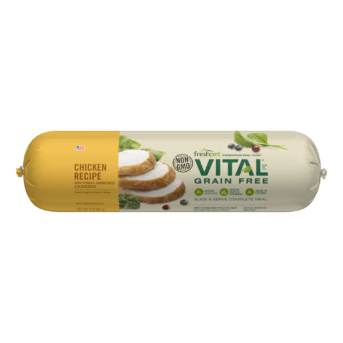
Freshpet Vital Grain-Free Chicken Recipe With Spinach, Cranberries & Blueberries is one of 8 rolled recipes included in our review of the Freshpet Vital Rolled product line.
Freshpet Vital Grain-Free Chicken Recipe With Spinach, Cranberries & Blueberries derives the bulk of its meat protein from chicken. Dry matter label analysis reveals the recipe contains 43.2% protein, 27.3% fat and 21.5% estimated carbs… resulting in a fat-to-protein ratio of about 63%.
Non-GMO ingredients – A grain-free recipe with antioxidant-rich fruits & vegetables.
Read our review of the full Freshpet Vital Grain Free Dog Food (Refrigerated Rolls) range here
Main Ingredients Chicken, spinach, cranberries, blueberries, chicken broth Type Grain-Free Protein Percentage 43.2% AAFCO Standards All Life Stages Best For Puppies & Dogs Sample buyer review...
Read more buyer reviews at Freshpet.com"I bought this food a week ago and I can see a change in my dog. I transitioned him to the new food for 4 days because he was throwing up his canned food for Digestive Care."
More Top Picks
To view more top dog foods by category… click the link below that best meets your personal feeding needs.
Here are the most frequently asked questions we get about sustainable dog food:
Frequently Asked Questions
What does it mean when pet food is labelled organic?
Organic pet food is a type of pet food made from ingredients that are produced and processed according to certain organic farming standards and regulations. These standards vary by country, but in general, organic pet food is made from ingredients that are grown without the use of synthetic pesticides, herbicides, or genetically modified organisms (GMOs).
Organic pet food typically contains organic ingredients, such as organic meats, fruits, and vegetables. These ingredients are grown and raised without the use of synthetic chemicals or GMOs.
Organic pet food usually avoids artificial additives, preservatives, and synthetic flavors or colors. Instead, it relies on natural ingredients for flavor and nutrition.
Organic pet food brands often prioritize transparency in their sourcing and manufacturing processes. They may provide information about the sources of their ingredients and their adherence to organic standards.
Some organic pet food brands also prioritize the humane treatment of animals. This may include using organic meats from animals that have been raised in more ethical and sustainable conditions.
Organic farming practices tend to be more environmentally friendly, with a focus on soil health, reduced chemical runoff, and biodiversity conservation.
It’s important to note that the term “organic” is regulated and certified by government agencies in many countries, such as the United States (USDA Organic) and the European Union (EU Organic). Products labeled as organic must meet specific criteria and undergo regular inspections to ensure compliance with these standards.
What does USDA-certified mean?
USDA Certified refers to products that have been certified or approved by the United States Department of Agriculture (USDA) through various programs and certifications. The USDA is a federal government agency responsible for overseeing and regulating various aspects of agriculture, food production, and related industries. USDA certification indicates that a product or process has met specific standards and requirements set by the USDA. Here are a few common USDA certifications:
USDA Organic certification is one of the most well-known USDA certifications. It applies to agricultural products and food items that are produced using specific organic farming practices. To earn the USDA Organic label, farms and food processors must adhere to strict guidelines, which include avoiding synthetic pesticides, genetically modified organisms (GMOs), synthetic fertilizers, and certain animal husbandry practices. The USDA Organic label assures consumers that the product has been produced in accordance with these organic standards.
The USDA also provides grading and inspection services for various agricultural products, including meat, poultry, dairy, fruits, and vegetables. These services ensure that products meet specific quality and safety standards. For example, USDA grades are often seen on meat and poultry packages, indicating the product’s quality and characteristics.
This certification is for products made from renewable biological resources, such as plant-based materials. The USDA Certified Biobased label indicates the percentage of biobased content in a product, allowing consumers to make environmentally conscious choices.
USDA Certified Meat and Poultry Labels: The USDA provides labels for meat and poultry products to indicate their inspection and certification status. These labels indicate that the products have been inspected for safety and quality.
When you see a USDA Certified label on a product, it means that the product or process has undergone evaluation and meets specific standards established by the USDA. This certification often signifies quality, safety, and compliance with specific regulations, and it can provide consumers with confidence in the products they purchase. The specific requirements and standards associated with USDA certification can vary depending on the program or label in question.
What does non-GMO mean?
Non-GMO stands for “Non-Genetically Modified Organism.” It refers to foods, crops, or products that have not been genetically modified through genetic engineering techniques. Genetically modified organisms (GMOs) are organisms whose genetic material has been altered in a way that does not occur naturally through mating or natural recombination.
Here are some key points to understand about non-GMO:
Non-GMO foods and crops are produced using traditional breeding methods, such as selective breeding or cross-breeding, to achieve desired traits. These methods have been used in agriculture for centuries.
Non-GMO products have not had their genetic material altered by inserting genes from unrelated species, which is a common technique in genetic engineering. In contrast, GMOs often involve the insertion of genes from other organisms to confer specific traits, such as resistance to pests or tolerance to herbicides.
In many countries, including the United States, products that are certified as non-GMO may carry a “Non-GMO Project Verified” label or similar certification to indicate that they have been verified as not containing genetically modified ingredients.
Some consumers choose non-GMO products due to concerns about potential health or environmental impacts associated with genetic engineering. They may prefer products labeled as non-GMO to have greater transparency and control over what they eat.
The regulation of GMOs and non-GMO labeling varies by country and region. Some countries have strict regulations and labeling requirements for GMOs, while others have more lenient or voluntary labeling systems.
It’s important to note that the use of GMOs in agriculture and food production remains a subject of debate and controversy. Supporters argue that genetic engineering can help increase crop yields, reduce the need for chemical pesticides, and enhance the nutritional content of foods. Critics express concerns about potential environmental effects, allergenicity, and the concentration of seed ownership in the hands of a few large corporations.
When you see a “Non-GMO” label on a product, it indicates that the manufacturer has taken steps to ensure that the ingredients used in that product are not derived from genetically modified organisms. However, it’s essential to understand that this label does not necessarily imply any specific health or safety benefit; it primarily reflects a production method and consumer preference.
Is insect protein good for dogs?
Insect protein is a novel protein which is usually suitable for dogs with allergies. It might be a good option to try if your dog suffers with itchy skin or an upset stomach.
Insect protein is considered sustainable for several reasons:
High Feed Conversion Efficiency: Insects are highly efficient at converting the feed they consume into edible protein. They require significantly less land, water, and food compared to traditional livestock like cattle or pigs. This efficiency can help reduce the environmental footprint of protein production.
Low Greenhouse Gas Emissions: Insects generally produce fewer greenhouse gas emissions per unit of protein compared to traditional livestock. They have a smaller carbon footprint because they produce less methane and nitrous oxide, which are potent greenhouse gases associated with cattle and other ruminant animals.
Reduced Land Use: Insect farming requires much less land compared to traditional livestock farming. This can help conserve natural habitats, reduce deforestation, and protect biodiversity.
Short Lifecycle: Most insects have a short lifecycle, which means they reach maturity and can be harvested relatively quickly. This short time to harvest results in faster protein production and reduced resource requirements compared to longer-lived livestock.
Diverse Feed Sources: Insects can be raised on a variety of organic waste materials, such as food scraps and agricultural byproducts. This ability to convert waste into protein reduces the environmental impact associated with waste disposal.
Water Efficiency: Insect farming typically requires less water than traditional livestock farming. This is especially important in regions with water scarcity issues.
Reduced Antibiotic Use: Insects are less prone to diseases that require the use of antibiotics compared to some traditional livestock. This can help reduce the overuse of antibiotics in agriculture, which is a major concern for antibiotic resistance.
Versatile Farming Methods: Insect farming can be done in various systems, including vertical farming, which allows for efficient use of space and resources.
High-Quality Protein: Insects are a rich source of high-quality protein, containing essential amino acids and important nutrients like vitamins and minerals.
Cultural Acceptance: In many cultures, insects are already a part of traditional diets, making them more acceptable as a protein source in those regions. This can reduce the pressure on conventional livestock production.
Reduced Food Waste: Insects can help reduce food waste by consuming organic materials that might otherwise end up in landfills.
While insect protein shows promise as a sustainable protein source, there are still challenges to overcome, including regulatory hurdles, scaling up production, and consumer acceptance in some regions where insects are not traditionally consumed. However, ongoing research and development in the field of entomophagy (the consumption of insects) continue to explore the potential of insect protein as a sustainable and nutritious food source for the future.
Can I feed my dog a vegan or vegetarian diet?
Feeding your dog a vegan or vegetarian diet is possible, but it’s a decision that should be made carefully and with the guidance of a veterinarian or a veterinary nutritionist. Dogs are omnivores, which means they can eat a variety of foods, including both plant-based and animal-based ingredients. However, there are important considerations to keep in mind.
Dogs require specific nutrients to thrive, including protein, amino acids, vitamins, and minerals. Animal-based sources, such as meat, are rich in essential nutrients like complete proteins, vitamin B12, and iron. If you decide to feed your dog a vegan or vegetarian diet, it’s crucial to ensure that the diet is nutritionally balanced to meet your dog’s specific needs.
Dogs need protein for muscle development and overall health. Plant-based protein sources like legumes, tofu, and grains can be included in a vegan or vegetarian dog’s diet, but it’s essential to provide enough protein and ensure that it contains all the essential amino acids that dogs require.
Vitamin B12 is primarily found in animal-based products, so if you feed your dog a vegan diet, you’ll need to provide a reliable source of B12 supplementation. A deficiency in vitamin B12 can lead to health issues.
Taurine is an amino acid that dogs need, and it is primarily found in animal tissues. Some vegan dog diets may lack sufficient taurine, so you should monitor your dog’s taurine levels if you choose a vegan diet and consider supplementation if needed.
Read our full article on this subject.




